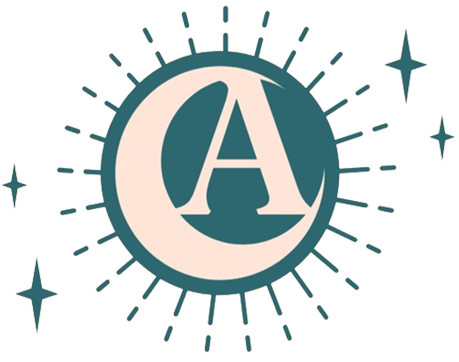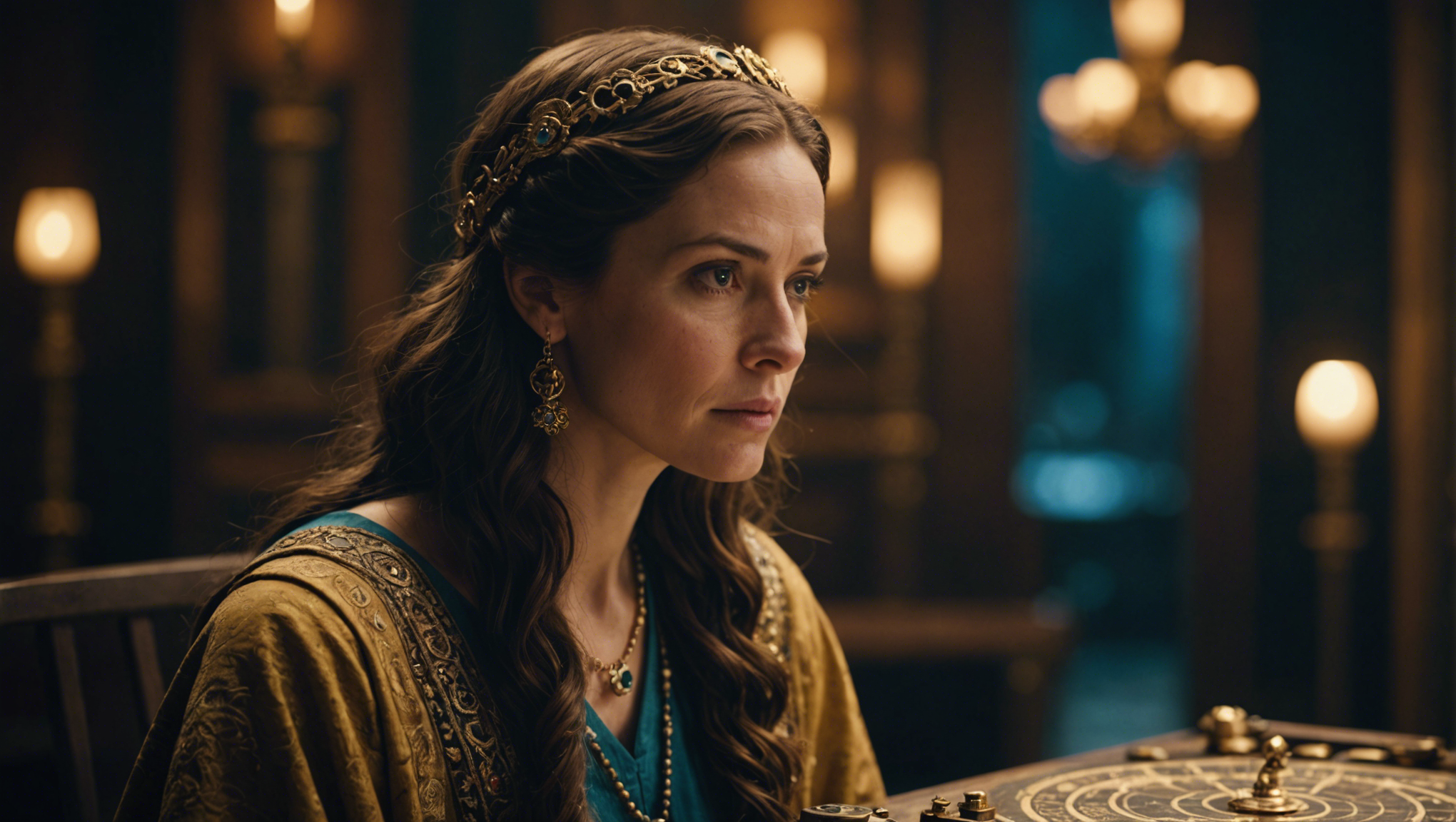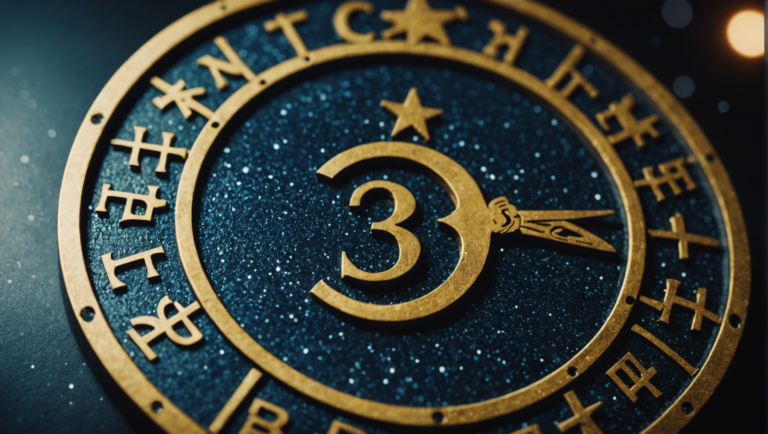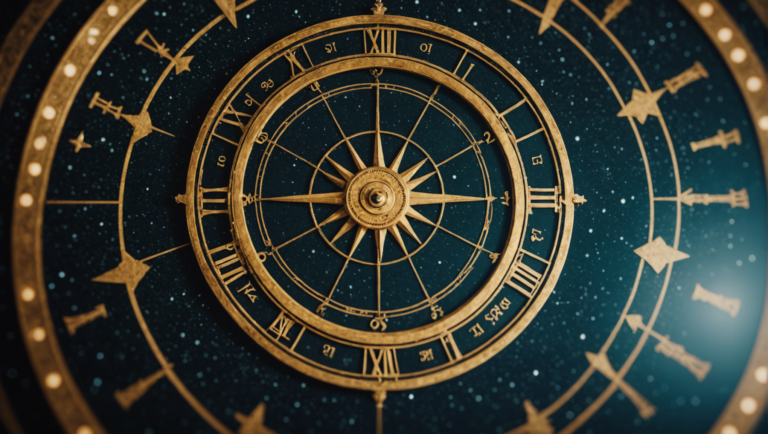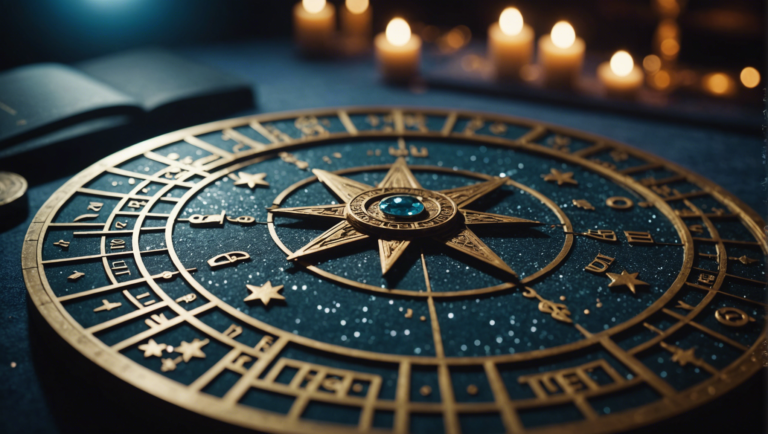A Maiden Astrologer Divines The Future
Exploring the Mystical Realm of a Maiden Astrologer: Unveiling the Future
In the ever-evolving narrative of human curiosity, the art of astrology has remained a constant, navigating through centuries as a compass for those seeking guidance from the stars. The image of the astrologer, however, has morphed—from the bearded sage to an equally compelling vision of youth and femininity. Enter the domain of a maiden astrologer, a figure embodying both ancient wisdom and contemporary insight, tasked with divining the future through celestial interpretations.
A Glimpse into Astrological Realms
Astrology, often dismissed by skeptics as mere superstition, thrives on the principle that the positions and movements of celestial bodies can profoundly influence human affairs and natural phenomena. At the heart of this mystical practice is the maiden astrologer, whose youthful appearance belies the depth of her knowledge and the seriousness with which she approaches her craft.
Her methodology is both scientific and intuitive, drawing upon a rich tapestry of astrological charts, planetary movements, and zodiacal signs to forecast events and reveal personal destinies. The practice, ripe with symbols and complexities, demands not only a comprehensive understanding of celestial mechanics but also an innate sensitivity to the subtle energies that govern our lives.
The Role of Intuition and Knowledge
The maiden astrologer stands at the confluence of tradition and innovation, her insights forged in the crucible of rigorous study and psychic intuition. This dual approach is critical, as astrology entails more than the mechanical recitation of chart interpretations—it requires a connection with the cosmic energies that are in constant flux around us.
This unique blending of skills empowers the maiden astrologer to unveil hidden aspects of our personalities, guide us through our challenges, and unlock the potential lying dormant within us. Her readings, often sought at life’s crossroads, offer a source of comfort and clarity to those navigating the murky waters of the unknown.
The Tools of the Trade
Central to the maiden astrologer’s practice are her tools—the natal chart, planetary transits, and the ever-important ephemeris. The natal chart, a snapshot of the sky at the moment of one’s birth, serves as the foundation of all astrological analysis, revealing the complex interplay of energies that influence an individual’s character and life path.
Transits, the current movements of the planets as they dance across the celestial sphere, provide a dynamic layer of interpretation, illuminating periods of challenge, growth, and transformation. The ephemeris, an exhaustive almanac of planetary positions, stands as an indispensable reference, aiding the astrologer in pinpointing the precise timings of crucial cosmic events.
Bridging the Cosmic Divide
In her quest to divine the future, the maiden astrologer does more than forecast impending events; she bridges the cosmic divide, connecting the macrocosm of the universe with the microcosm of individual human experience. This act of bridging is both an art and a science, demanding a balance of analytical precision and empathetic understanding.
Her guidance, steeped in the ancient wisdom of the stars yet rendered in the language of the present, resonates with a wide audience, transcending cultural and generational boundaries. Through her, the celestial narrative unfolds not as a distant myth but as a living, breathing aspect of our daily lives, offering insights and inspiration drawn from the very fabric of the cosmos.
A Beacon for the Future
As we stand on the threshold of a new era, the role of the maiden astrologer becomes increasingly paramount. In an age characterized by rapid change and uncertainty, her insights provide a source of stability and hope, reminding us of the unchanging rhythms that guide the universe and, by extension, our lives.
By interpreting the whispers of the stars, she not only divines the future but also rekindles our connection to the ancient wisdom that has illuminated the human journey for millennia. In her, we find a modern oracle, a custodian of the celestial secrets, and a beacon of light guiding us through the unfolding mystery of our existence.
The History and Evolution of Astrology: Connecting the Dots with Modern Practitioners
Astrology, with its intricate blend of celestial interpretations and human insights, has fascinated humanity for millennia. This discipline, often seen as a bridge between the material and the spiritual, has undergone significant evolution. Its journey from ancient star-gazing practices to the present day, where astrologers use apps and algorithms alongside ancient charts, underscores a vibrant history that resonates with modern practitioners. In exploring the history and evolution of astrology, we uncover how today’s practitioners are weaving these age-old practices into the fabric of contemporary life.
The Origins of Astrology: Gazing into the Past
The genesis of astrology lies in the ancient civilizations that first turned their eyes skyward, observing the movements of the stars and planets. These initial observations led to the recognition of celestial patterns and the belief that the heavens reflected the earthly and human realms. Ancient Babylonia, around the second millennium BCE, is often cited as the birthplace of astrology, where priests interpreted celestial events as divine communications.
From Babylon, astrology spread to other great civilizations, including Egypt, Greece, and eventually Rome. Each culture adapted the practice, integrating it into their own religious and societal frameworks. The Greeks, for example, significantly advanced astrological practice by identifying the zodiac signs and associating them with mythological figures, thereby laying the groundwork for the Western astrology that is widely practiced today.
The Renaissance: Astrology’s Golden Age
The Renaissance period marked a notable resurgence in astrological interest in Europe, fueled by the rediscovery of ancient texts and the emergence of notable astrological scholars. This era saw astrology being applied in medicine, politics, and even in the selection of suitable dates for significant occasions. Astrologers were highly regarded, often serving kings and nobility, and their influence permeated all levels of society.
The invention of the printing press in the 15th century further propelled astrology into the public sphere, making astrological charts and readings accessible to a broader audience. This period underscored the belief in astrology as a science that could provide insights into the natural world and human behavior.
Astrology in the Modern Age: Bridging Tradition and Technology
The age of Enlightenment and the rise of empirical science brought skepticism to astrology, pushing it to the fringes of mainstream scientific thought. Yet, astrology’s appeal has not waned. Instead, it has morphed, finding new expressions and adherents in the contemporary world.
Modern practitioners of astrology draw on the same celestial bodies and constellations that guided ancient astrologers but employ tools like computer software for intricate chart calculations. Social media and the internet have revolutionized the dissemination of astrological knowledge, making personal horoscopes and cosmic insights available instantly to anyone with an internet connection.
Contemporary Astrology: A Maiden Astrologer Divines the Future
In today’s context, a phrase like "a maiden astrologer divines the future" evokes imagery that blends both the mystical allure of traditional astrology with the vibrancy of modern practitioners. It highlights how contemporary astrologers, much like the maiden archetype, approach the practice with a sense of wonder, exploration, and innovation.
Astrology’s robust presence on digital platforms, from YouTube astrological forecasts to Instagram meme pages, reflects its enduring relevance. Modern practitioners often focus on psychological and personal growth aspects of astrology, using it as a tool for self-awareness and understanding rather than strict fortunetelling.
This blend of historical reverence and contemporary application makes astrology a unique field. It is both an ancient practice and a modern phenomenon, continually evolving while staying rooted in the foundational belief of a cosmic connection to human life.
The history and evolution of astrology illustrate a remarkable journey of resilience, transformation, and adaptability. Modern practitioners, armed with the wisdom of the past and the tools of the present, continue to divine the future, bridging the gap between ancient traditions and the possibilities of the new age. Astrology, with its enduring legacy, remains a testament to humanity’s perpetual quest to understand the universe and our place within it.
Astrological Symbols and Their Impact on Personal Destiny
In the intricate tapestry of the cosmos, each thread, represented by astrological symbols, weaves the unique narrative of personal destiny. These symbols, timeless and profound, serve as keys to unlocking the deeper aspects of our persona and the potentially transformative path that lies ahead. As we delve into the enigmatic world of astrology, it’s essential to understand the impact of these celestial emblems on our journey through life.
Exploring the Zodiac Signs and Their Influence
The zodiac, a celestial belt composed of twelve signs, forms the core of astrological practice. Each sign, linked to a specific period of the year, embodies unique characteristics, strengths, and challenges. The sign under which one is born significantly influences one’s personality, emotions, and life path.
Aries, the first sign, symbolizes the beginning and bursts with the energy of leadership and initiative. In contrast, the contemplative and sensitive nature of Pisces, the last sign, reflects a deep connection with the spiritual realm. Understanding the inherent qualities of each sign provides insight into our innate dispositions and how we interact with the world.
The Planets and Their Astrological Significance
Planets in astrology are viewed as celestial bodies that exert influence over various aspects of our existence. Each planet governs specific facets of life, from emotions and intellect to ambition and transformation.
For instance, Venus rules love and beauty, guiding matters of the heart and our aesthetic inclinations. Meanwhile, Mars drives our ambitions and dictates our approach to challenges and conflicts. By analyzing the planets’ positions and their interactions with the zodiac signs, astrologers divine insights into personal growth, career paths, and relational dynamics.
The Houses: Framework of Astrological Interpretation
Astrological houses, numbering twelve, offer a spatial dimension to the astrological chart, providing a stage upon which the drama of our lives unfolds. Each house corresponds to different life areas, including identity, finances, communication, and relationships, among others.
The placement of planets within these houses during one’s birth chart reading reveals the spheres of life most affected by celestial energies. For example, a planet situated in the fourth house, the domain of family and home, highlights the importance of domestic matters and one’s foundational security.
Navigating Life’s Journey Through Aspects
Aspects, the angles planets form with one another, further refine the narrative of personal destiny depicted by the astrological chart. These angles signify the relationships between different parts of our psyche and life experiences, manifesting as harmonious or challenging influences.
Conjunctions, when planets are in close proximity, denote power and intensification of energies, potentially fostering talent or, conversely, tension. Trines and sextiles, considered beneficial aspects, facilitate flow and ease in realizing one’s potential. Conversely, squares and oppositions present obstacles and conflicts that, while difficult, promote growth and resilience.
Harnessing Astrological Knowledge for Personal Empowerment
Understanding astrological symbols and their impact does not imply a deterministic view of life but rather offers a tool for navigation and self-discovery. By engaging with these celestial symbols, one gains insights into inherent traits, behavioural patterns, and the timing of life’s cycles.
Embracing this knowledge empowers individuals to make informed choices, optimize strengths, and address weaknesses. It encourages a mindful approach to life’s challenges and transitions, fostering personal growth and fulfillment.
In essence, delving into the realm of astrological symbols opens a gateway to deeper self-awareness and an enriched understanding of one’s place in the universe. This ancient wisdom, when approached with respect and openness, provides invaluable guidance on the journey toward personal destiny, illuminating the path with the stars’ timeless light.
The Science Versus Spirituality Debate: Where Astrology Stands
In the vast universe of knowledge and belief, the intersection of science and spirituality often elicits vibrant debate, with astrology standing as a particularly contentious point. This age-old practice, drawing upon the movements and positions of celestial bodies to divine information about human affairs and terrestrial events, occupies a unique space in the cultural zeitgeist. It resonates deeply with those inclined toward spirituality, yet often clashes with scientific skepticism. Here, we explore the nuanced landscape where astrology resides, dissecting its historical roots, current applications, and the ongoing debate between its proponents and the scientific community.
The Historical Context of Astrology
Astrology’s origins can be traced back thousands of years, evolving across cultures and continents. Its primary premise — that the positions and movements of celestial bodies influence earthly events and human lives — served as early humanity’s attempt to make sense of the cosmos and their place within it. Ancient civilizations, including the Babylonians, Greeks, and Chinese, meticulously charted the heavens, believing that such celestial phenomena could predict seasons, guide agricultural practices, and foretell significant life events.
Despite its historical significance, the advent of modern science brought a shift in perspective. The scientific method, emphasizing empirical evidence and replicability, challenged astrology’s foundational principles, leading many to question its legitimacy. Yet, even amidst scientific advancements, astrology has experienced a resurgence, finding a place in modern spiritual practices and pop culture.
Bridging the Gap Between Science and Spirituality
The debate between science and spirituality often centers around the concept of evidence. Science relies on quantifiable data, while astrology, like many spiritual practices, operates on a level of meaning and symbolism not easily measured by standard scientific methodologies. This discrepancy forms the crux of the ongoing contention. Proponents of astrology argue that it provides personal insights and psychological benefits that, while not empirically measurable, are nonetheless real to the individual.
Recent discussions have explored the potential for a middle ground — not to validate astrology through scientific means but to acknowledge it as a form of narrative tradition and personal enrichment. It serves as a means for individuals to reflect on their lives, make sense of their experiences, and navigate the future with a sense of hope and purpose.
The Role of Astrology in Modern Society
In contemporary culture, astrology has seen a significant resurgence, especially among younger generations. Social media platforms teem with astrological forecasts, personality breakdowns based on zodiac signs, and meme culture that humorously integrates astrological concepts. Far from fading into obscurity, astrology has adapted to the digital age, becoming more accessible and intertwined with daily life.
This modern embrace of astrology highlights a broader spiritual awakening or search for meaning beyond the material world. For many, astrology offers a form of solace, a way to understand their emotions, relationships, and the seemingly random events of life through a more mystical lens.
Navigating the Future: Astrology as a Cultural Phenomenon
While the debate between science and spirituality regarding astrology is unlikely to be resolved soon, its role as a cultural phenomenon is undeniable. Rather than dismissing astrology outright, there’s an increasing call among open-minded individuals in both the scientific and spiritual communities to consider the ways in which it enriches lives — as a source of comfort, a tool for self-reflection, and a vehicle for connecting with a tradition that spans millennia.
As our understanding of the universe expands, so too does our appreciation for the myriad ways in which humans find meaning in the cosmos. Astrology, with its rich history and modern resurgence, stands as a testament to the enduring human desire to seek guidance from the stars. Whether viewed through the lens of science or spirituality, it remains a fascinating facet of human culture and consciousness, inviting us to ponder our place within the vast, mysterious universe.
Practical Advice for Incorporating Astrological Insights into Daily Life
Astrology, an ancient practice that has enchanted humankind for centuries, continues to offer insights into the fabric of our daily lives. With the resurgence of interest in the mystical and metaphysical spheres, many are turning their gaze toward the stars for guidance. Astrology, far beyond mere sun signs, provides a nuanced toolset for making sense of our complex world. The narrative of a maiden astrologer divining the future illustrates a journey into understanding oneself and the cosmos. Here is how one can fold astrological wisdom into their everyday life pragmatically.
Leveraging Your Natal Chart for Self-Discovery
Your natal chart, a snapshot of the heavens at your moment of birth, acts as a cosmic blueprint of your potential, challenges, and strengths. Understanding the placement of planets in different houses and signs reveals intricate details about your personality, aspirations, and even your challenges. It’s advisable to begin with a comprehensive chart reading from a reputable astrologer. Dive into the meaning of your sun, moon, and rising signs as foundational elements of your astrological profile.
Utilizing Transits and Progressions to Navigate Life
Astrological transits—the movement of planets at the current time in relation to their position at your birth—highlight upcoming themes or events in your life. Similarly, progressions, a technique that symbolizes inner growth and evolution, offer insights into personal development phases. By tracking significant transits and progressions, you can align your actions with the cosmic tide. This approach isn’t about prediction but about understanding the underlying currents of your life to navigate more effectively.
Embracing the Moon’s Cycle for Emotional Well-being
The lunar cycle, from new moon to full moon, impacts our emotional and physical realms. Each phase holds specific energies that can be harnessed for personal growth, healing, and manifestation. For example, setting intentions during the new moon and releasing what no longer serves you during the full moon can be powerful rituals. Reflecting on how the moon’s phases correlate with your feelings and experiences brings a deeper awareness and harmony to your emotional landscape.
Astrology in Daily Planning and Decision Making
Astrology into your daily planning can add a level of insight into your regular activities. Paying attention to the moon sign can guide you on the best days for social activities, self-care, or focused work. Mercury retrograde periods, often maligned for communication snafus and technology breakdowns, can be used for revisiting and revising projects rather than launching new initiatives.
Building Relationships with Astrological Insight
Understanding the astrological compatibility between you and the people in your life, whether in love, friendship, or work, can illuminate dynamics and offer strategies for harmony. Astrology does not dictate the fate of relationships but provides tools for empathy and understanding. By recognizing the various needs, styles of communication, and love languages through an astrological lens, one can foster deeper connections and navigate conflicts more gracefully.
Developing Intuition and Spiritual Practice through Astrology
Astrology, at its heart, is a spiritual practice that connects us to the universal rhythms and cycles. Engaging with astrology in a mindful, reflective manner can enhance your intuition. It encourages a meditative observation of the inner self and the outer world, seeing the synchronicities and symbols that guide us toward our highest path. astrological insights into meditation or journaling can be particularly enriching.
Astrology offers a rich, symbolic language that, when understood and applied thoughtfully, enhances our journey through life. Like the maiden astrologer divining the future, we too can learn to read the signs and signals that guide us, finding in them the wisdom to live more fully and authentically. It’s a reminder that we are not merely under the stars but of the stars, participating in an cosmic dance that invites us to explore, understand, and grow.
Conclusion
Venturing through the mystical landscape navigated by a maiden astrologer, we embark on a journey that transports us beyond the confines of the tangible world, offering a glimpse into the veiled territories of future occurrences. This exploration does more than just satisfy our curiosity; it re-connects us with a tradition as ancient as civilization itself, tracking its evolution from the oracles of antiquity to the modern-day custodians of celestial knowledge. These practitioners, linking the past with the present, demonstrate that astrology remains deeply interwoven with the human experience, serving as a bridge between the empirical and the ethereal, the scientific and the spiritual.
As we delved into the history and evolution of astrology, we uncovered the enduring threads that have sustained it through millennia, revealing its resilience and adaptability. Astrology’s journey from the courts of ancient empires to the digital screens of today illustrates not a floundering pseudoscience as critics might suggest, but a dynamic field of study that has continuously evolved to meet the changing needs and understandings of society. The survival and thriving of astrology in the face of modern skepticism speak to its ingrained relevance and the human appetite for understanding life’s mysteries through the cosmos.
The discourse on astrological symbols and their impact on personal destiny uncovers a fascinating tapestry of cosmic influences that many believe guide the events and outcomes of human life. These symbols, intricate and rich in meaning, offer a unique lens through which individuals can introspect and navigate their paths through life’s complexities. Whether it’s the bold confidence of a Leo sun or the intuitive depths of a Pisces moon, these celestial insignias provide a personal guidebook, teeming with insights into strengths, challenges, and opportunities for growth and fulfillment.
In the arena of science versus spirituality, astrology often finds itself at the heart of debate, encapsulating the tension between empirical evidence and the intangible aspects of human existence. This discourse, however, enriches the conversation around astrology, pushing it into new territories of understanding and interpretation. By embracing its position on the fringes of mainstream science, astrology offers a unique perspective that complements rather than contradicts the pursuit of knowledge, bridging the gap between the material world and the spiritual realm with its archetypal language and symbolism.
The exploration into practical advice for incorporating astrological insights into daily life embodies the essence of astrology as a tool for personal development and self-awareness. Beyond its predictive capabilities, astrology serves as a reflective mirror, encouraging individuals to consider underexplored aspects of their personalities and life choices. It prompts a deeper engagement with the spiritual dimensions of existence, offering a framework for understanding the ebb and flow of life’s fortunes and challenges. This practical application of astrology underscores its value not as a deterministic doctrine, but as a guide for mindful living and decision-making.
This journey through the enigmatic domain of astrology, escorted by the insightful gaze of a maiden astrologer, ushers us into a realm where the celestial and terrestrial converge, where the fabric of fate and free will intertwine. It’s a voyage that illuminates the enduring human quest for meaning and understanding in an unpredictable world. Through the lens of astrology, we glimpse not only the potentialities of the future but also the timeless wisdom embedded in the stars—wisdom that has guided souls through the ages, offering light amidst the mysteries of existence. As we navigate the complexities of modern life, the insights gleaned from the celestial sphere remain as relevant and revealing as ever, inviting us to reflect, choose, and act with greater depth, awareness, and harmony with the cosmic dance that envelops us.
